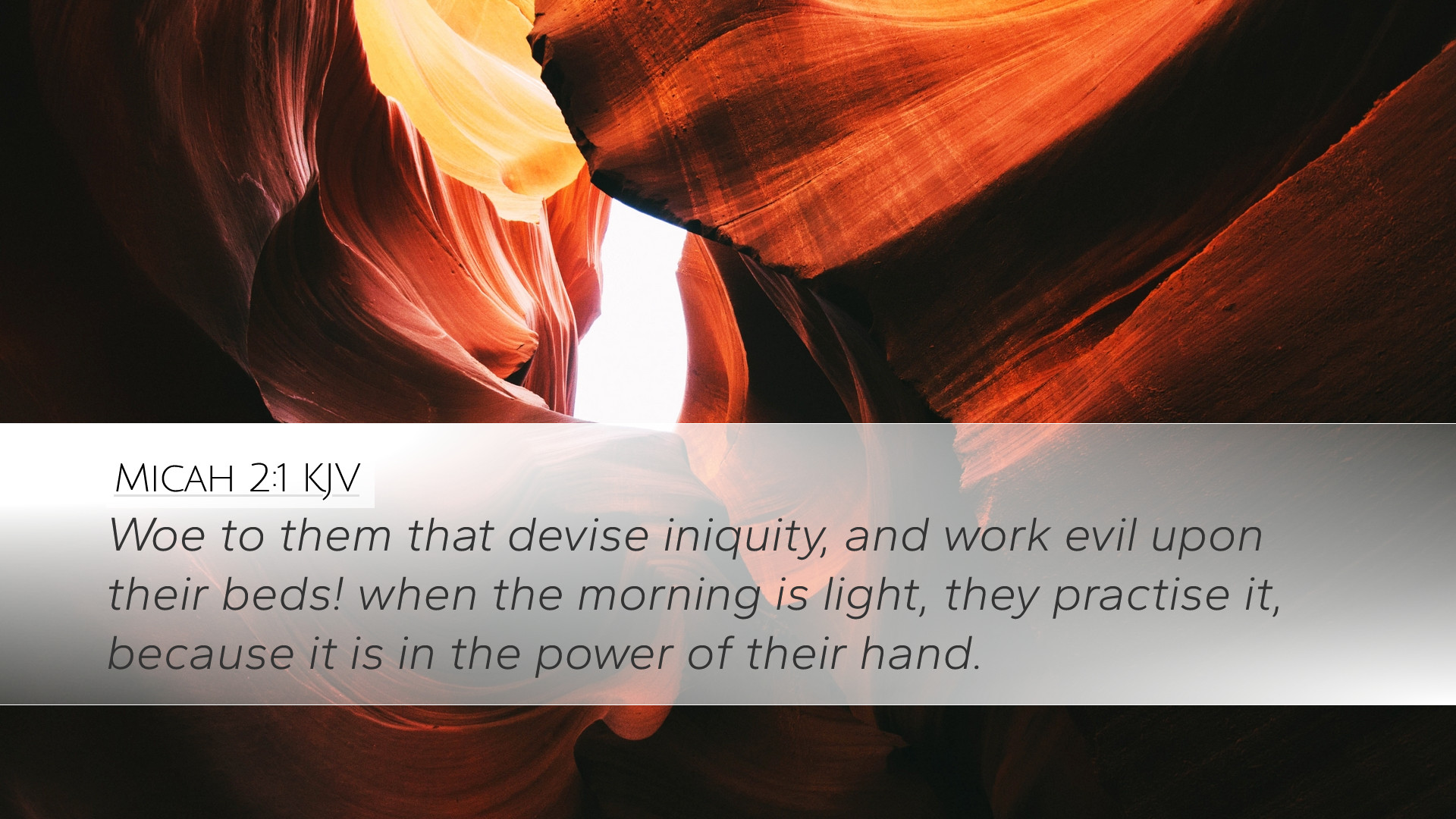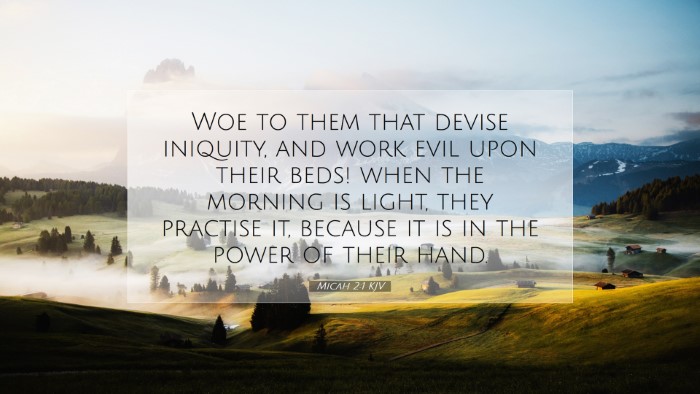Old Testament
Genesis Exodus Leviticus Numbers Deuteronomy Joshua Judges Ruth 1 Samuel 2 Samuel 1 Kings 2 Kings 1 Chronicles 2 Chronicles Ezra Nehemiah Esther Job Psalms Proverbs Ecclesiastes Song of Solomon Isaiah Jeremiah Lamentations Ezekiel Daniel Hosea Joel Amos Obadiah Jonah Micah Nahum Habakkuk Zephaniah Haggai Zechariah MalachiMicah 2:1
Micah 2:1 KJV
Woe to them that devise iniquity, and work evil upon their beds! when the morning is light, they practise it, because it is in the power of their hand.
Micah 2:1 Bible Commentary
Commentary on Micah 2:1
Bible Verse: Micah 2:1 - "Woe to those who devise wickedness, and work evil upon their beds! When the morning is light, they practice it, because it is in the power of their hand."
Introduction
The book of Micah, a profound prophetic work, highlights the social injustices and moral decay present in Israel during the eighth century B.C. Within the prophetic discourse, Micah 2:1 serves as a striking indictment of those who engage in premeditated evil. This verse encapsulates the themes of justice, divine judgment, and the serious consequences of sin, making it relevant for pastors, students, theologians, and scholars alike.
Verse Analysis
This verse opens with a strong exclamation of woe, a term often used by the prophets to express deep sorrow and impending judgment. The construction of the opening phrase implies an urgent warning, pointing to the agitators of societal sin.
The Nature of Wickedness
Matthew Henry notes that the wickedness described here is not merely incidental but is meticulously schemed at night, demonstrating how the ungodly have made evil a contemplative priority. It indicates a sinister premeditation, wherein individuals plot their injustices “upon their beds.” This imagery evokes a picture of sleepless nights consumed by thoughts of evil and wrongdoing.
The Deception of Inaction
Albert Barnes elaborates that those who devise wickedness lack the perception of accountability to divine standards. The metaphor of “working evil upon their beds” captures a spiritual lethargy—an act of delay that falsely allows individuals to think they will escape consequence. It is this same sense of complacency that leads to a continuation of their wrongful activities at daybreak when their plots manifest into reality.
The Action of Practicing Evil
As daylight breaks, what was plotted in darkness becomes action. Micah poignantly points out that these conspirators of evil don’t just think about their plans; they act upon them. Adam Clarke emphasizes that the transition from thought to action is critical; it reveals a heart condition that is entirely corrupt. Sin has a progressive nature—what starts as planning flourishes into real harm towards others.
Implications of Divine Perspective
The phrase “because it is in the power of their hand” indicates that these individuals possess the means to carry out their evil intentions. However, this power is conditional upon the moral structure ordained by God.
The Ethics of Power
Matthew Henry suggests that power without accountability often leads to the exploitation of the weak. The implication is clear: God will hold these wicked individuals to account for their actions, as true power ought to align with justice and righteousness rather than deceit and injustice.
The Call for Reflection
The nature of their scheming presents a profound warning for contemporary readers. Albert Barnes encourages introspection, urging us to assess whether we too become entangled in wicked schemes, underestimating God’s observing presence and eventual judgment.
Broader Theological Context
Understanding Micah 2:1 within the broader narrative of Scripture highlights the continual tension between human wickedness and divine justice. Throughout biblical accounts, the patterns of human behavior often repeat. The account of Israel’s history contains numerous instances where God’s people failed to uphold justice and righteousness, leading to eventual judgment.
Eschatological Significance
In a broader eschatological context, Micah’s warning can also be applied to future judgments. The sinfulness depicted foreshadows the ultimate accountability all will face before God. Adam Clarke asserts that this serves as a preparatory alert—calling individuals to repentance before inevitable judgment arrives, much like those who plotted in Micah's time.
Practical Applications
For pastors, this verse can be an effective tool in teaching congregations about the seriousness of hidden sins and the need for integrity in thoughts and actions. For students and scholars, it poses foundational questions about ethics in power dynamics, emphasizing that one’s inner life inevitably manifests in outward behavior.
Encouragement Towards Righteousness
- Self-Examination: Individuals should regularly assess their thoughts and intentions, ensuring alignment with God’s standards.
- Community Awareness: Engaging actively within communities to prevent systemic injustices can echo the prophetic call of Micah.
- Empowering the Vulnerable: The powerful should protect and uplift those who cannot defend themselves, reflecting Christ-like righteousness.
Conclusion
Micah 2:1 serves as a timeless reminder that the pathway of wickedness, rooted in premeditated evil, leads to destruction and judgment. The weight of its message carries through the ages, urging believers to cultivate thoughts of righteousness. As we navigate our lives, let us heed the warnings of Micah and commit our actions to justice, living under the light of accountability and the fear of the Lord.


